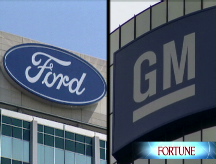Year of the bailout - and now GM?
General Motors has asked the government for a hand. Here's where a GM bailout would rank among other government programs.
NEW YORK (CNNMoney.com) -- The government has stepped in with nearly $152.5 billion to try and stabilize AIG. The nation's banks are tapping even more. Now General Motors wants its own bailout.
On Friday, GM (GM, Fortune 500) said it is running out of cash, and "will approach the minimum amount necessary to operate its business" by the end of this year.
The automaker said unless the economic environment changes quickly and sales improve, it would need help from the government.
Congress this year has already given the U.S. auto industry $25 billion in low-interest loans, meant to help speed the transition to more fuel-efficient vehicles.
Late last month, GM and Chrysler appealed to the Treasury for $10 billion to finance a merger that both said would save their companies - but those merger talks have been set aside, GM said Friday.
GM indicated it would need the government to provide it with an additional $25 billion to help it shift to fuel-efficient cars, and another $25 billion to fund retiree costs.
And with peers like Ford (F, Fortune 500) and Chrysler also reporting staggering declines in sales and cash flow, talk of an industry bailout is in the air.
The government already has put up close to $3 trillion in its efforts to stabilize the U.S. economy - here's where a GM handout would fit in:
The government has taken these steps to aid financial institutions.
Term-auction facility: $1.4 trillion in loans to banks so far in exchange for otherwise unwanted collateral. The Fed increased its monthly auction limit to $300 billion in October, up from $20 billion when the Fed began the program.
Dollar swap lines: Unlimited dollars to 13 foreign central banks to provide liquidity to foreign financial institutions. The Fed lifted its cap after raising it to $620 billion in October from $24 billion in December.
Bear Stearns: $29 billion in a special lending facility to guarantee potential losses on its portfolio. With the lending facility, JPMorgan was able to step in to save Bear from bankruptcy.
Lending to banks: $77 billion lent on average every day to investment banks, after facility opened to non-commercial banks for first time in March.
Cash injections: $250 billion to banks in exchange for equity stake in the financial institutions in the form of senior preferred shares.
Mortgage-backed securities purchases: Up to $450 billion allotted to purchase troubled assets from banks.
Fed rate cuts: Down to 1% in October 2008, from 5.25% in September 2007.
Consumers are benefiting from the government's actions in recent months.
Stimulus checks: $100 billion in stimulus checks made their way to 140 million tax filers to boost consumer spending and help grow the economy.
Unemployment benefits: $8 billion toward an expansion of unemployment benefits, to 39 weeks from 26 weeks.
Bank takeovers: $11.4 billion drawn down so far from the FDIC's deposit insurance fund after 19 bank failures in 2008.
Rehab foreclosed homes: $4 billion to states and municipalities in assistance to buy up and rehabilitate foreclosed properties.
Student loan guarantees: $9 billion so far in government purchases of student loans from private lenders. Higher borrowing costs made student loans unprofitable for a number of lenders, many of whom stopped issuing the loans.
Money-market guarantees: $50 billion in insurance for money-market funds. The Fed then began to lend an unlimited amount of money to finance banks' purchases of debt from money-market funds. The Fed then agreed to purchase up to $69 billion in money-market debt directly. In October, the Fed said it would loan up to $600 billion directly to money-market funds.
Housing rescue: $300 billion approved for insurance of new 30-year, fixed-rate mortgages for at-risk borrowers. The bill includes $16 billion in tax credits for first-time home buyers. But lenders have been slow to sign on.
Deposit insurance: $250,000 in insurance for interest-bearing accounts, up from $100,000. The FDIC also issued unlimited guarantees on non-interest- bearing accounts and newly issued unsecured bank debt.
Uncle Sam has intervened to help companies in the following ways.
Business stimulus: $68 billion in tax breaks to corporations to help loosen the stranglehold on businesses trying to finance daily operating expenses.
Fannie Mae, Freddie Mac: $200 billion to bail out the mortgage finance giants. Federal officials assumed control of the firms and the $5 trillion in home loans they back.
AIG: $152 billion bailout, including initial $85 billion through a direct loan and a $38 billion lending facility. On Nov. 10, new deal announced that includes a direct investment through preferred shares, easier terms on a $60 billion loan, and new facilities meant to take on the companies exposure to credit-default swaps.
Automakers: $25 billion in low-interest loans to speed the industry's transition to more fuel-efficient vehicles.
Commercial paper facility: $243 billion in corporate debt purchased so far by the Fed since its so-called Commercial Paper Funding Facility opened. ![]()


